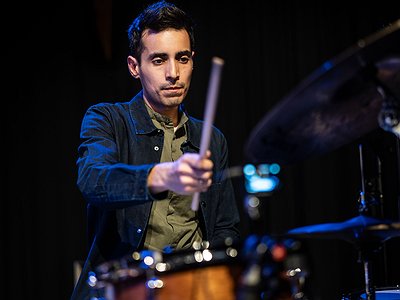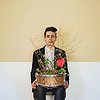Part 2
Derek Bailey defined improvising as the search for material which is endlessly transformable. Regardless of whether or not you agree with his perspective, what kind of materials have turned to be particularly transformable and stimulating for you?
Recently I have been thinking a lot about why I play improvised music and I think the fact that you cannot play who you were yesterday is something that deeply resonates with me and is the primary source of my existence and my arts practice.
I want to express new ideas and something that is absolutely true to this moment and true to today that represents who I am now. That is the beauty of improvisation and the only way to do that is to play the present and not the past. You can only prepare yourself for these moments of true improvisation where you are really in the moment and speaking in the now.
The ego also comes into play - where you are thinking about How am I sounding? Do I sound like I'm killing it? Is my solo great? Is the band sounding great? In the recent past I have started to think about my improvisation and my musical presentation as a way of story telling. That gives me an anchor and support where I can express myself more authentically and truly of the moment I am in, the context I am in and the stories I am trying to convey through the music. That is more important for me than the proficiency or how amazing a improvisation or solo is, the context is a stimulating factor for me.
How is playing live in front of an audience and in the studio connected? What do you achieve and draw from each experience personally? How do you see the relationship between improvisation and composition in this regard?
Playing live in front of an audience and playing in the studio are definitely connected, especially when it comes to improvised music. I don’t think we would play differently if we had an audience or whether we were in the studio. That is a conscious choice, the band and I have been discussing and really thinking about a lot where we don’t want our music to be a documentation of a set of compositions. What we want is a true representation of how we sound when we perform.
The record, The Shape of Things to Come is an example of that where we really performing and playing our hearts out in the studio rather than thinking about documenting the music in the studio and everything to be precise and absolutely perfect.
I do enjoy both environments a lot. It’s great to be on stage and receive a live response from my audiences. With improvised music, another great part of having an audience is that they can contribute with their energy and their attentiveness to our performance versus a studio environment where you can have a pristine audio environment.
With regards to the relationship between improvisation and composition, I feel I don’t see the difference now or a distinction between the two. In the words of Wayne Shorter - Composition is actually improvisation in slow motion. For me both of these things are the same.
Could you take us through a day in your life, from a possible morning routine through to your work? Do you have a fixed schedule? How do music and other aspects of your life feed back into each other - do you separate them or instead try to make them blend seamlessly?
More recently, I have been trying to find an equilibrium and I really like the word equipoise because it’s almost like I am striving for this balance because I do so many things.
The past year and a half I have tried to maintain a fixed schedule which helps me to maintain my arts practice. A typical day for me is waking up and having chai without which I can’t function in the morning. Then I start my morning practice with a little bit of trumpet or ear training or some piano. I try to do something more meditative and something that centers me in the morning. Pretty much until lunch time I am kind of absent from a lot of real world communication and I try to be in my zone of practice. Since I play a couple of instruments after my trumpet practice, I get into the drum room. Drum being my primary instrument end of taking up a lot of time.
Post lunch is when I engage with some normal activity of life where I will speak with my manager or if there is any admin work. I am at my studio and if there is some tunes that I am writing/finishing, working on productions, so between 3-6 or 7 PM I am deeply engaged in the creative process of actually writing and producing music. Then of course there is a bit of work out or yoga, a run maybe if the air is nice in Delhi. A little bit of cooking with my partner, maybe reading a book in the night. An ideal day for me and most of the days are spent like this.
Of course there are days when I am on tour or there is more teaching or writing happening, certain things take priority but ideally and typically I like to maintain my arts practice which has given me a good source of input an output. I have more or less been able to operate in this manner over the last couple of months as well, especially with being in lockdown with Covid. This is how I engage with my arts practice and I do take a lot of inspiration from my regular life of interacting with people and my relationships.
I feel like to produce great art one also has to have a great life and I extremely value my friendships, my relationship with my partner, my parents and all of these things feedback into my arts practice and the kind of stories and music I want to present to my audiences.
Could you take me through the process of improvisation on the basis of one of your performances that's particularly dear to you, please? Where did the ideas come from, how were they transformed in your mind, what did you start with and how do you refine these beginnings into the finished work of art?
I think the piece that I want to talk about with regards to process of improvisation is ‘Dr. Escher’ from my latest EP ‘The Shape of Things to Come’. I think this performance in the studio relates to your previous question of playing in the live/studio context, in this situation what we have captured on the EP is the process of improvisation which is really limitless. It speaks of the very fact that not only am I allowing myself to be present in the moment but also facilitating and allowing the band to operate with a high level of awareness in that musical moment. If you hear this piece, I almost feel like I am on the edge of my seat because the musicians I am playing with - who are Sharik Hassan playing piano and synth bass, Oli Hirvonen playing guitar and Adam O’Farrell playing the trumpet - all of them being so proficient and skilled with their craft which allows them to let go of that very fact that they are not really the instrument but playing the composition and the moment in the music. We are also still of course together in the context of this piece.
For an improvisation to be successful or impactful, context establishment is very important. This piece is written in Misra Chapu which is 7 beat cycle in Carnatic music. Whilst that is the rhythmic skeleton of the piece, it is kind of an elongated version of a 7 beat cycle which almost feels like a 14 beat or a 21 beat cycle. The reason I wrote that with these chords that are drawing from a non functional harmony is to create this illusion that there is almost no resolution in the piece. This allows us to create a cyclical formation where we can not only feed off each other's energies and musical ideas but also at the heart of the piece is the speech of B.R Ambedkar and my inspiration for the art, theories and concepts of Dutch artist, MC Esher. I wanted to amalgamate these two worlds in my head through this piece of music and that’s what the improvisation really speaks about.
Switching between being a band leader, artist, conductor and composer, I am constantly taking up these roles in each moment and then also not taking up these roles and allowing a new idea and new mindset to come into play. The process of improvisation has been very dear to me because for a long time I have been chasing the idea of having a sound for the band which I also cannot envision. When I heard this recording and a few snippets of one of our rehearsals where we deeply spoke about how we want to sound - which is with no pre determination of where the music could go, nobody taking the role of a band leader or composer even though part of the piece is written. It was all about speaking in the moment and trusting each other's musical and story telling ideas and sporting that in our expression - which has been quite a transformative experience.
There are many descriptions of the ideal state of mind for being creative. What is it like for you? What supports this ideal state of mind and what are distractions? Are there strategies to enter into this state more easily?
Improvisation and being creative is definitely a state of mind. What allows me to be in an ideal state of mind is finding that equilibrium of feeding myself new, artistic, creative, traditional information with regards to the art form I want to create and then allowing myself to assimilate all this information and being in the process of deep study. Doing these two prophecies of feeding myself new information and allowing myself to assimilate leads to an ideal state of mind of creation. I may not write every day of the week but when I do wish to write or feeling an idea, that creative process becomes a lot more attainable and I can achieve it quite fast.
Some of the distractions that I do face are more technical. With regards to ‘Dharma’ I am an unorthodox and an unconventional composer. I don’t sit with a manuscript and pencil and start to jot down my musical ideas. I write in an emotive way, where sometimes the title comes to me first and then the music starts to speak from me. I have to be very aware of these moments as I have to allow myself to have that ideal state of mind and a space so when I am feeling these creative spurts I am around my instruments or things I can express through. It could be a notebook where I can pen down some lyrics, ideas or titles or surrounding myself with a piano and synthesiser where I can actually express myself to document the first seed or germ of an idea.








